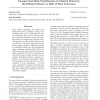443 search results - page 64 / 89 » Learning from a Population of Hypotheses |
GECCO
2006
Springer
14 years 1 months ago
2006
Springer
1 Learnable Evolution Model (LEM) is a form of non-Darwinian evolutionary computation that employs machine learning to guide evolutionary processes. Its main novelty are new type o...
AAAI
2007
14 years 5 days ago
2007
This paper introduces an innovative approach for automated negotiating using the gender of human opponents. Our approach segments the information acquired from previous opponents,...
ATAL
2008
Springer
13 years 12 months ago
2008
Springer
In this paper, we deal with the sequential decision making problem of agents operating in computational economies, where there is uncertainty regarding the trustworthiness of serv...
ICML
2010
IEEE
2010
IEEE
Unsupervised Risk Stratification in Clinical Datasets: Identifying Patients at Risk of Rare Outcomes
13 years 11 months ago
Most existing algorithms for clinical risk stratification rely on labeled training data. Collecting this data is challenging for clinical conditions where only a small percentage ...
SMC
2007
IEEE
14 years 4 months ago
2007
IEEE
— The computational understanding of continuous human movement plays a significant role in diverse emergent applications in areas ranging from human computer interaction to phys...

